Blaire feels bad about saying no to friends. How can she think about things differently?
Scroll down for podcast TRANSCRIPT, DISCUSSION QUESTIONS, and how to submit YOUR CHILD’S QUESTION.
Do you love the Kids Ask Dr. Friendtastic podcast?
Here are three ways you can support it:
Post a review on the Apple Podcasts app or your favorite podcast platform.
Send in your child’s question.
Become a paid subscriber to help keep the podcast free for everyone. (You’ll get free access to an online workshop each month.)
Would YOUR kid enjoy being featured on the podcast?
Adults, please use your smartphone's memo function or an audio app to record your child's question. Hold the phone close to your child's mouth to make sure the recording is clear. Have your child state:
their FIRST NAME (or another first name),
their AGE, and
a BRIEF QUESTION or concern about friendship. (Please do not include any friends' names.)
Submit the audio file at https://DrFriendtastic.com/submit. I’ll answer as many questions as I can. (Obviously, this is not psychotherapy, and it’s not for emergency situations.)
Think About It Questions to discuss with your child
For a quick and easy friendship lesson, play the podcast up to the end of the kid’s question, then ask your child/students what advice they’d give. Play my answer, then use the discussion questions below to deepen your child’s/students’ understanding.
Think of a time you had to say no to a friend. What happened? How hard or easy was it for you to say no? How did your friend react?
Why is it important to say no to friends sometimes? How can saying no help a friendship? How can NOT saying no sometimes hurt a friendship?
Why do you think kids are sometimes nervous or uncomfortable about saying no to a friend?
What could you say if a friend is disappointed or annoyed when you say no?
When is it okay to say yes to a friend, even if it’s not exactly what you want?
Transcript
Hi, there! I’m Dr. Eileen Kennedy-Moore, also known as Dr. Friendtastic. I’m an author and clinical psychologist based in Princeton, NJ.
Here’s today’s question:
Hi, my name is Blaire, and I'm 12 years old. How do you say no without feeling bad?
Hi, Blaire. Thanks for sending in your question! A lot of kids struggle with this issue!
We like our friends, and we want them to like us, so saying no can feel like we’re hurting a friendship. But actually, a thoughtful no can save a friendship.
When we avoid saying no and give a reluctant yes, it’s like we’re saying to a friend, “OK, I’ll do what you want, but then I’m going to hold it against you!” Do you think your friend would like that deal? Definitely not! That’s not fair to either of you!
Resentment is a bitter feeling that happens when we believe we’ve been treated badly or forced to accept something that we don’t like. For instance, if your friend always insists that you play her game and never agrees to play your game, you might feel resentful. Or, if a friend begs to borrow something precious of yours, and you really, really, really don’t want to lend it, but you feel like you have to say yes…That’s a recipe for resentment!
Resentment is poison in any relationship. If we’re not careful, resentment can build up and build up until you explode in anger at your friend. And then your poor friend feels hurt and confused. Your friend had no idea there was a problem because you never said no!
So how do we prevent resentment? By saying no when we need to. Of course you don’t want to say no all the time. If it doesn’t matter to you or it matters a lot to your friend, you may want to go along with what your friend wants, even if it’s not exactly what you want. But if you think you’ll feel resentful if you don’t say no, then you need to say no.
You can say no politely. Just say “No, thanks” or “No, I’m not comfortable doing that” or “No, I don’t want to do that. How about if we do this, instead?”
An honest no helps your friend get to know you better. Your friend can’t tell what you don’t like or don’t want to do unless you say no.
Now, sometimes kids worry that a friend will get annoyed if they say no. That could happen, but you can work through that rough spot with your friend.
It might help to explain why you’re saying no. If your friend is very disappointed, you might want to apologize for being unwilling or unable to do what they want, but stay firm in your no. You might need to say no more than once if your friend argues. But even if your friend is displeased in the moment, honest but kind communication is what’s going to help your friendship last.
So, instead of feeling bad about saying no, remind yourself that a thoughtful no can be an important way to protect your friendship.
This has been Kids Ask Dr. Friendtastic. If you have a question about making and keeping friends that you’d like me to answer, go to DrFriendtastic.com, and click on the podcast tab to see how to submit your question.
Do you want to learn even more about friendship? Check out my funny and practical books for kids: Growing Friendships: A Kids’ Guide to Making and Keeping Friends, and my new book, Growing Feelings: A Kids’ Guide to Dealing with Emotions About Friends and Other Kids. They’re available through your library or wherever you buy books.
The Dr. Friendtastic for Parents newsletter and the Kids Ask Dr. Friendtastic podcast are for educational purposes only. They may or may not be relevant for your particular situation. I trust you to use your judgment about what’s right for your child and your family.






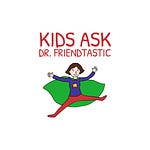
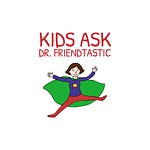
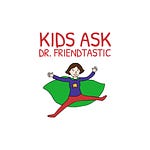
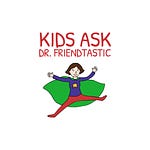

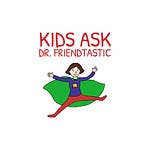
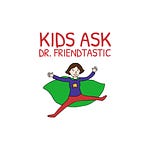
Blaire, Age 12: Say no without feeling bad